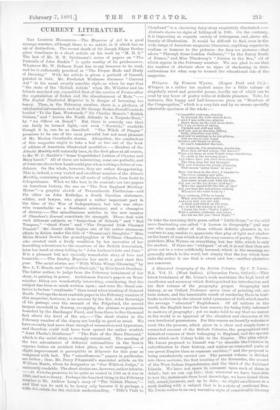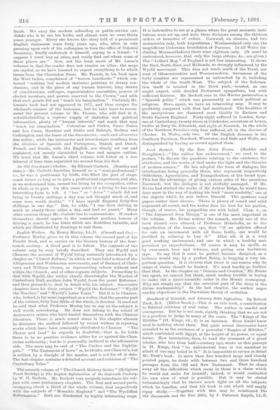Historical Geography of the British Colonies. By C. P. Lucas,.
B.A. Vol. II. (West Indies). (Clarendon Press, Oxford).—This latest instalment of Mr. Lucas's work maintains the high level of excellence and accuracy which distinguished his introduction and his first volume of the geography proper. Geography and history, as an Oxford Professor never tires of pointing out, aro- twin sisters, and the lamentable result of sundering them in text- books is obvious in the almost total ignorance of both which marks the average "educated" Englishman. Of all nations in the- world, the English have the best reasons for being fully informed in matters of geography ; yet we make bold to say that no nation in the world is so ignorant of the situation and character of its. own territorial possessions. For this reason we heartily welcome a work like the present, which gives in a clear and simple form connected account of the British Colonies, the geographical and historical reasons of their belonging to England, and the special place which each Colony holds in the Empire. The plan which Mr. Lucas proposed to himself was "to describe the Colonies in subordination to their history, and rather as connected parts of one great Empire than as separate entities ;" and the proposal is being satisfactorily carried out. Tho present volume is divided into three sections, the first treating of the Bermudas, the second of the West Indian Dependencies, and the third of the Falkland Islands. Wo have not space to comment upon each of these in detail ; but we can say this : that wherever we have been able to test the statements from local ,knowledge, we have found them full, sound,:accurato, and up to date,—no slight excellences in a. work dealing with a subject that is in a state of continual flux. Mr. Lucas writes in an easy narrative style of considerable ,literary
finish. We envy the modern schoolboy or public•service can- didate who is to use his books, and almost wish we were thirty years younger. Every one knows the story told of a prominent English statesman some forty years ago, who, after in vain pressing upon each of his colleagues in turn the office of Colonial Secretary, finally undertook it himself, saying to a friend : "I suppose I must buy an atlas, and really find out where some of these places are." Now, not the least merit of Mr. Lucas's volumes is, that the reader does not require an atlas ; the maps are capital, as we have learned to expect everything to be which issues from the Clarendon Press. Mr. Froade, in his book upon the West Indies, complained of "barren handbooks " which con- tained "nothing but modern statistics pointing to dreary con- clusions, and in the place of any human interest, long stories ef constitutions, suffrages, representative assemblies, powers of elected members, and powers reserved to the Crown," and adds that such points did not "touch his imagination." Certainly Mr. Lucas's book had not appeared in 1877, and thus escapes the wholesale censure of the historian ; but we take leave to recom- mend the present volume to Mr. Fronde, who will find in it, notwithstanding a copious supply of statistics and political information, plenty of " human interest," and much that may ' touch his imagination." Columbus and Cortez, Vasco Nunez and Les Cases, Hawkins and Drake and Raleigh, Rodney and Codrington, and the times of the buccaneers,—each and all receive due notice ; while the intricacies and interchanges resulting from the rivalries of Spanish and Portuguese, Danish and Dutch, French and Swede, with the English, are clearly set out and explained, not merely chronicled in bare and meagre outline. We trust that Mr. Lucas's third volume will follow at a less interval of time than separated his second from his first.











































 Previous page
Previous page